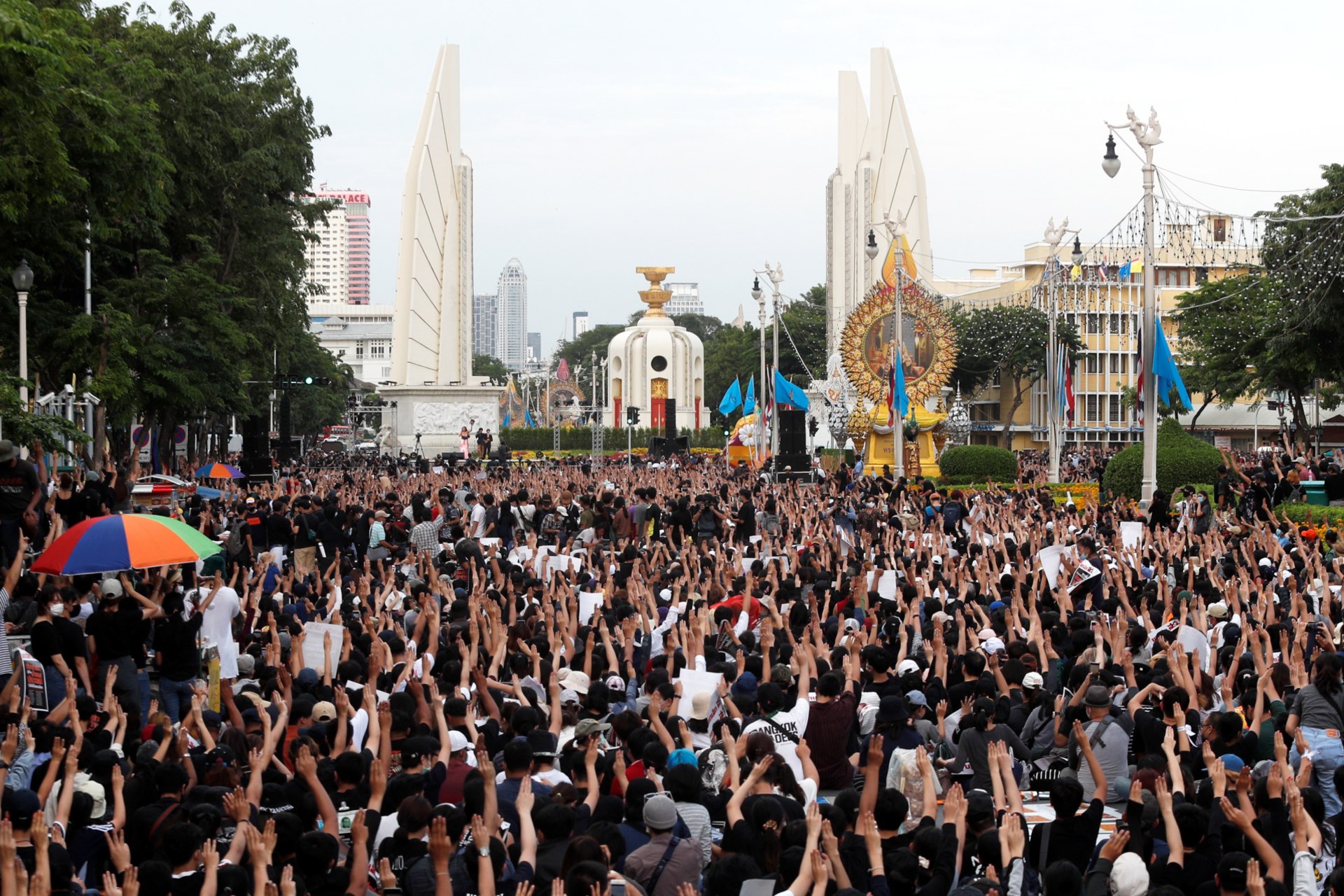Thailand Protests Increasingly Challenge the Monarchy

By experts and staff
- Published
Experts
![]() By Joshua KurlantzickSenior Fellow for Southeast Asia and South Asia
By Joshua KurlantzickSenior Fellow for Southeast Asia and South Asia
By
- Guest Blogger for Asia Unbound
Pavin Chachavalpongpun is associate professor at Kyoto University’s Center for Southeast Asian Studies.
A coalition of Thai youths, students and political activists has launched a series of protests since mid-July 2020. Over the weekend, the demonstrations swelled to the largest street protests in the kingdom since a coup six years ago, with some ten thousand protestors gathered around the Democracy Monument in Bangkok. When protests first started, their requests appeared to target solely the government. They called for the dissolution of parliament (so that fresh elections would be organized), amendments to the constitution and an investigation into the cases of abduction and killing of Thai dissidents outside of the kingdom. Many chanted “down with dictatorship” and gave the Hunger Games three-finger salute.
In recent years, at least nine Thai dissidents living outside the country have been disappeared, with several of them turning up dead in a gruesome fashion. The weekend protests went off mostly peacefully, even though protesting is technically illegal under a current state of emergency. But the kingdom’s long history of brutal crackdowns on protest leaves cause for concern about a potentially violent eventual response, if demonstrations continue and possibly grow in size and forcefulness.
The protests also have been driven by rising anger at the Thai military—the current government, though elected, is dominated by a pro-military party and led by former junta leader Prayuth Chan-ocha—and at the country’s febrile economy. In particular, although the government has had an effective record at containing COVID-19, with one of the lowest case counts and death tolls in Asia, political opponents have grown angry that the government has maintained a tough state of emergency, and some quarantines, while allowing the armed forces to disregard quarantine. (In fact, the kingdom’s success at battling COVID-19 has made it more feasible to hold street protests, with demonstrators having less fear that they will spread the virus by marching, chanting, and gathering.)
And, even though the Thai government has handled COVID-19 well, the kingdom’s tourism and trade–dependent economy has been battered. The Thai economy shrank by 12.2 percent in the second quarter 0f the year, its worst downturn since the time of the Asian financial crisis. The severe downturn, combined with Thailand’s persistently high inequality and still-rigid economic and social hierarchies—it is one of the most unequal countries in the world—animates opposition, especially among younger people graduating from university, struggling to find work, and rebelling against traditional hierarchies.
But the protests also, increasingly, have come to focus on the monarchy, normally a taboo subject, in part because of harsh lèse-majesté laws the criminalize criticism of the king and other senior royals—laws that have been wielded repeatedly to jail and silence Thais. In this way, the protests are astounding—there has not been such a direct and public challenge to the Thai monarchy in decades. The demonstrators, as the New York Times reported, gathered and “raised their hands in defiance below a giant image of the king dressed in coronation regalia.” Demonstrators have held signs saying “No god, no kings, only man.” Some protestors have openly called for changes to the monarchy, while many student demonstrators have urged Thais to seriously address issues with the monarchy that have long affected their lives. On Twitter in Thailand, Thai hashtags that essentially mean “Why Do We Need a King” have circulated. One of the core leaders, Arnon Numpa, a young lawyer-turned-activist, repeatedly has called for an immediate reform of the monarchical institution, arguing that the king, Maha Vajiralongkorn, has bolstered his power through different channels.
For several decades now, the supposedly constitutional monarchy of Thailand has often proven to extend its powers beyond constitutional norms and rules. Under the reign of King Bhumibol Adulyadej (1946-2016), the monarchy intervened in politics, playing a role in sanctioning the overthrow of several civilian governments, while also using a network of allies to regularly wield power behind the scenes in Thailand. But the former king enjoyed a significant degree of reverence among Thais; his son, current King Maha Vajiralongkorn does not. Since the ascendance to the throne of King Vajiralongkorn, it has been evident that he has sought to augment his power, politically and financially. King Vajiralongkorn also could be seen to have paid little heed to the effects of COVID-19; he travels back and forth to Thailand frequently from Germany.
To increase pressure for change, several of the protest groups have proposed multiple demands, mostly regarding the role and responsibility of the monarchy. Some of their demands are rather radical in the context of Thailand. They have called for:
- Creating a division between the personal property of the king and the Crown Property Bureau (CPB). In 2018, King Vajiralongkorn took sole possession of the CPB, worth some U.S. $30 billion.
- An end to the palace intervening in politics. Thailand has had the most coups of any country in Southeast Asia—and by some measures of any country in the world. The current king has forged closed ties with the military.
- Nullifying the order that permitted the transfer of military units to the direct command of the royal palace.
- Ending state propaganda related to the monarchy.
- Investigating the deaths in exile of anti-monarchy activists.
The government and the palace so far have offered no signs of listening to demonstrators’ requests. It is unlikely that the government, or indeed the king, will give in the demands. Despite the mostly peaceful nature of the standoff so far, a number of students and activists have been arrested, charged and released on bail, including Parit Chiwarak, a Thammasat University student. And ultimately, given Thailand’s history and the strong views of Thai monarchists and the power of the military, the prospect of violence in Bangkok is very real.
